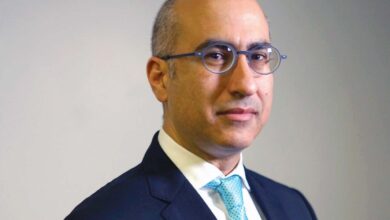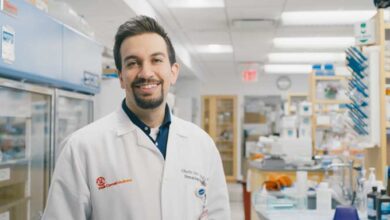Maher Elhassan
Vice President & General Manager
BD Middle East & North Africa
Maher Elhassan
“We were recognized for rapid response in addressing the pandemic”

BD has been named to Fortune’s Change the World list in 2020 for addressing critical healthcare needs during the novel coronavirus pandemic. ‘Hospitals’ magazine had the pleasure to meet Maher Elhassan, Vice President & General Manager, BD Middle East and North Africa, to highlight the initiatives and activities of BD during the pandemic.
BD has been named to Fortune’s Change the World list in 2020 for addressing critical healthcare needs during the novel coronavirus pandemic. What is the importance of this honorable recognition for the 4th time in 6 years?
The COVID-19 pandemic brought an unprecedented crisis to the world this year. In addition to ensuring health and safety, we saw governments and communities facing significant challenges while looking for ways to accelerate testing and diagnosis to prevent spread of the outbreak and attend to those affected.
As such, with our purpose of advancing the world of health by improving medical discovery, diagnostics and the delivery of care, we doubled down on what we do best — tapping our deep resources to help solve healthcare’s biggest problems; working with urgency to innovate and ensure the front lines have what they need to address this crisis; and making an impact on lives around the world.
In essence, our role evolved to become the first responder to the first responders. This year, we were recognized for our early, rapid response in addressing the pandemic by quickly mobilizing and working with urgency and purpose to react to the critical needs of the healthcare sector.
Can you brief us about your initiatives and activities during the pandemic? How did you respond rapidly to the critical needs of healthcare systems and patients during the virus? How was your team able to mobilize efforts and work to match with the needs of the pandemic from diagnosis to the delivery of care, and discovery of innovation?
As one of the largest global medical technology companies in the world, we are deploying our capabilities, expertise and scale to address critical health needs related to coronavirus – from our diagnostic offerings to identify COVID-19, to real-time informatics and electronic surveillance technology, to essential medical devices to support patient care. Some of our efforts include:
Being a critical supplier of swabs and other sample collection products for COVID-19, we launched multiple molecular tests, enabling clinicians to know if a patient currently has COVID-19. These molecular tests in a clinical lab, provided rapid results in two to three hours only. BD worldwide has recently launched another rapid 15-minute POC antigen test for faster COVID-19 testing, which can increase mass surveillance with faster results.
We worked closely on helping to secure access to critical devices for patient care in ICUs and field hospitals by scaling up manufacturing of necessary products, some of which saw an increase in manufacturing production of 100 folds. We also supported patient management in the ICUs through facilitating complex care with systems such as medication management, infusion pumps and sets, IV access, IV Care and Maintenance, Foley Catheters, as well as surveillance and analytics.
The rapid challenges and increased burden on healthcare systems identified the need for providing new training on infection control practices. Therefore, BD provided comprehensive digital education tools and training in infection prevention to frontline personnel that were involved in direct patient care including physicians, nurses, pharmacists, and laboratory technicians.
We also worked on accelerating discovery of potential therapies. Our solutions, instruments, and data analysis platforms have played an integral role in helping helping researchers rapidly deepen our understanding of COVID at a cellular level, specifically in clarifying our picture of the body’s immune system response.
To prepare for mass vaccination, BD has been working to ensure the availability and safe administration of treatment. As researchers move into clinical trials, we have a full suite of medication delivery devices to meet the needs of each potential drug. We have been in conversations with governments around the world to understand needs and scale up production. And we are already working to provide more than 500 million needles and syringes to support vaccination campaigns around the world, most of which will be supplied before early next year.
We have also stepped up to respond to the needs of communities through philanthropic and volunteer support. BD and the BD Foundation have issued nearly $2.5 million in philanthropic grants and product donations to non-profit partners that are working to protect the most vulnerable communities and individuals from the pandemic’s spread and negative impacts. And BD volunteers are heeding the call, too.
What were your efforts in addressing and combatting antimicrobial resistance as last year where you were named to Fortune’s Change for this?
To slow the spread of antimicrobial resistance (AMR) and to help ensure that the right drug is delivered to the right patient at the right time, a multifaceted approach to AMR was needed. And appropriate use of medical technology can help to reduce spread of infections in healthcare facilities, while diagnostic testing can enable the cause of infections to be more precisely identified, supporting effective treatment decisions. BD mobilized a company-wide AMR strategy team comprised of 40 employees from across our businesses, countries, and corporate functions. This team aligned and executed the various components of our AMR strategy. These included:
Training programs.
One of the most important steps to curbing the spread of antimicrobial resistance is to curb infections, as resistant infections spread easily among patients in healthcare facilities. This makes it imperative for hospitals to implement effective infection prevention and control programs. Therefore, we offered training programs for customers centered around its products and solutions that are often used in environments where healthcare associated infections (HAIs) are common (i.e., vascular access procedures, general surgery and urinary drainage procedures).
In addition to deploying these programs at an individual health facility level, we also worked in collaboration with national governments in multiple countries, including the U.S., China, Kenya, Cambodia and India, via public-private partnerships to improve infection prevention and control capabilities in hospitals.
Diagnostic testing.
With diagnostics playing a key role in identifying infection types, it helps ensure the right drug is prescribed. To address this BD partnered with the U.S. Department of State, U.S. President’s Emergency Plan for AIDS Relief (PEPFAR) and the U.S. CDC to advance the capacity and capabilities of labs in Africa and India to diagnose infectious disease.
The program, Labs for Life, has been acclaimed as being among the most successful public-private partnerships, and also improved the diagnosis of the resistant form of tuberculosis (TB), which is presently associated with approximately one-third of the 700,000 annual deaths presently attributed to AMR worldwide.
BD assays are developed with feedbacks from local surveys, to ensure specific antibiotics are tested according to local epidemiology and local practices. The unique assays for antibiotic susceptibility testing as per WHO criteria, enables the labs for rapid cost-effective testing to combat AMR.
Surveillance and reporting.
Control of AMR requires use of surveillance tools to ensure that the appropriate therapy is provided to patients. The tools can also help identify patients at greatest risk of contracting a resistant infection by incorporating information from a variety of sources as part of routine care. And the near real-time availability of data allows clinicians to make more targeted decisions to optimize the use of antibiotics.
In addition, surveillance tools can be used to create an early warning system to detect infections before an outbreak occurs, so that action can be taken to prevent or gain rapid control of an outbreak. Electronic surveillance systems enable healthcare facilities to transmit data to public health authorities to monitor local, regional and national trends.
By providing hospitals with surveillance tools, BD empowered clinicians identify and report healthcare associated infections, and assess AMR risks within their facilities.
Global impact.
Based on the fundamental premise that a challenge and threat as large and encompassing as AMR cannot ever be addressed by one sector alone, BD has engaged in extensive cross-sector collaboration with leading health agencies, foundations and other organizations around the world, underpinned by common motives and goals. We engaged directly with countries around the world to support infection prevention and control programs in hospitals and to advance laboratory practices, tailoring its approach to the stage of development of each country and the level of sophistication among hospitals in being able to combat AMR.




